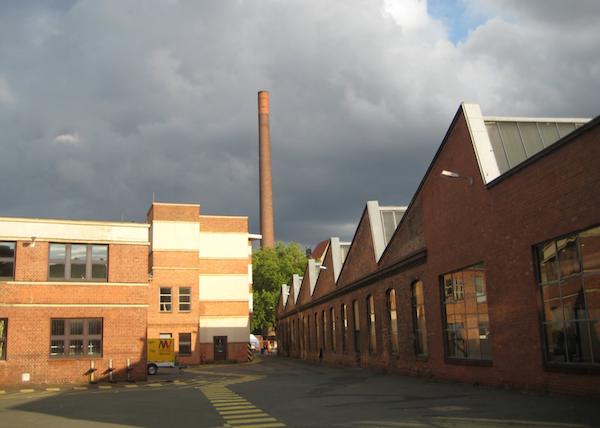
For artists, Berlin is perceived as the promised land, where rent is cheap and studio space is easy to come by. But increasingly, gentrification and commercialization are turning the German capital’s reputation into a thing of the past.
Berliner Zeitung reports that the latest battleground between art and commerce is the Uferhallen, a former bus depot in the northern district of Wedding which now houses 70 workshops and studios and where about 100 artists and musicians work, including Monica Bonvicini, John Bock, and Rosa Barba, to name a few (see As Rents Rise, Can Berlin Artists Still Afford a Place to Work?).
German sportswear giant Adidas is currently turning an exhibition space at the sprawling facility into an indoor soccer field, called Football Base. On Friday, the multinational corporation will host an exclusive party to celebrate the opening of the 3,500 square meter arena, which opens to the public on June 13.
The main hall has been transformed into an indoor soccer hall by Adidas.
Photo: Event Bonny
It is hardly surprising that the artists working at the site are concerned about the changes occurring on the property that houses their workplace. According to Berliner Zeitung, many fear increased noise levels will compromise their ability to work and that the commercialization of the site will ultimately lead to their eviction (see Berlin Artists Stage Protest Against Studio Evictions).
In attempt to allay their neighbors’ fears, Adidas presented the project to the artists two weeks ago. The director of Football Base, Malte Schruth, told Berliner Zeitung: “This is a sensitive ecosystem, which is why we sought a dialogue [with the artists] at an early stage.” Adidas plans to use the facility for a minimum of 18 months.
Adidas has taken over the entire former exhibition space.
Photo: kho-im-www.de
Manfred Peckl, an artist who rents a studio at the facility told artnet News in an email: “Of course it’s horrible, the visual dominance characterized by martiality is an outrage. The slogan ‘Destroy Berlin’ speaks volumes and of course also refers to the destruction of cultural outposts by the mainstream.”
However, the CEO of Uferhallen, Wolfgang Weber, dismissed the artists’ concerns. “The lease helps maintain the entire complex and keep rents for other users low,” he insisted.
Adding insult to injury adidas has also taken over ‘Waschbar,’ a popular artists hangout
Photo: Baunetz
So what does the community want? According to the paper Die Zeit, Wedding is one of Berlin’s youngest and most diverse districts. One fifth of its residents are 18 or younger. Also, 63 percent of residents are immigrants, and unemployment stands at 12.5 percent. The pride of Wedding are the Ghanaian-German soccer stars, the Boateng brothers, who grew up here.
While the Adidas project may threatens the artists’ studio spaces with commercialization, any development in the area should be welcome—especially if the investment gives vulnerable kids the chance to exercise, interact, and stay off the streets.
Oliver Brüggen, senior director of PR for central Europe at Adidas told artnet News via email: “The ‘Base’ is also a social initiative. It allows children from poor families who can’t afford the membership fees of sports clubs to participate in sport at a first class facility.”
“The displacement of the studios is not in Adidas’ interests,” he added. “Especially as the lease contract enables both entities to coexist. We are always open to further discussions with the artists.”